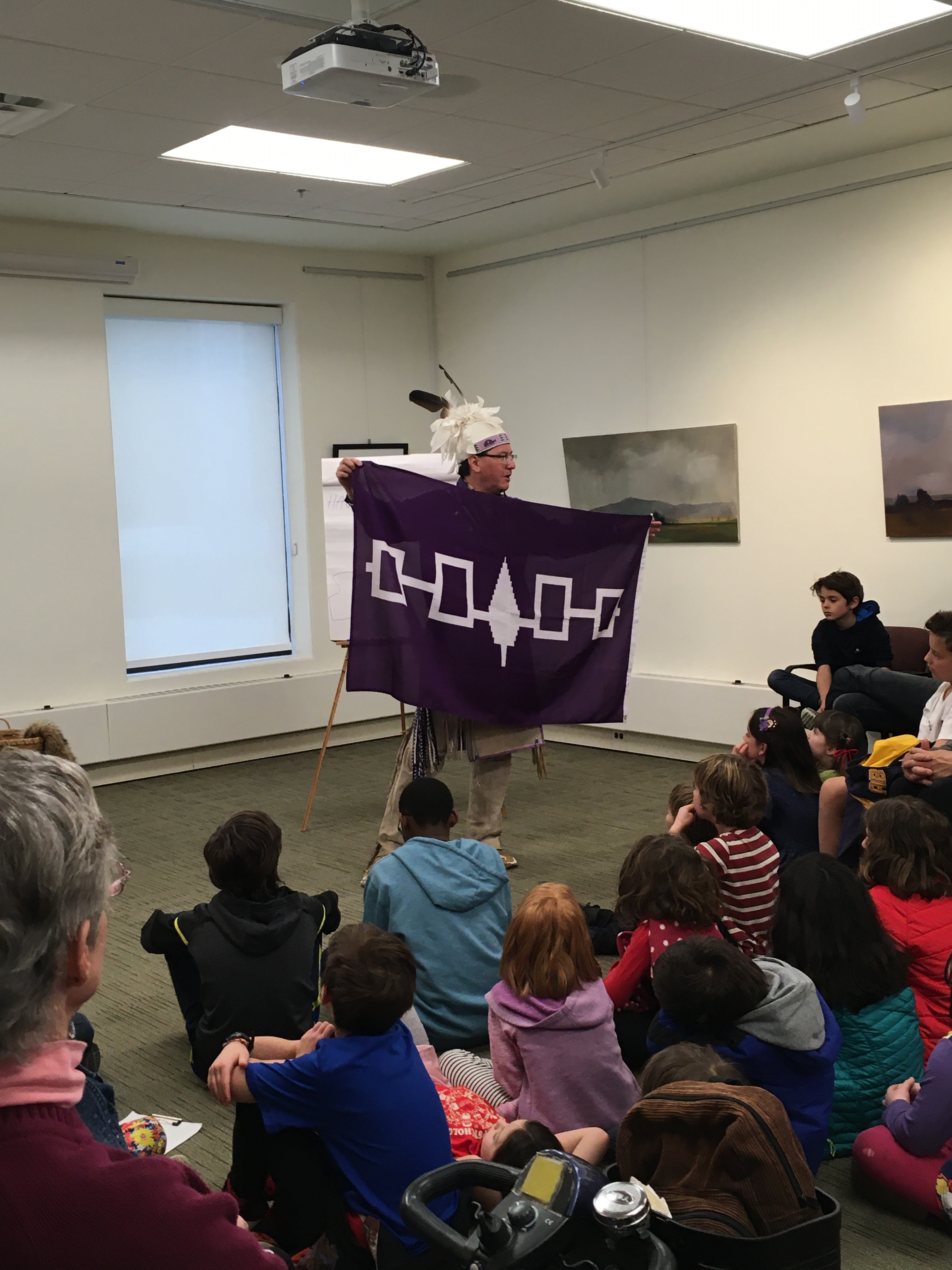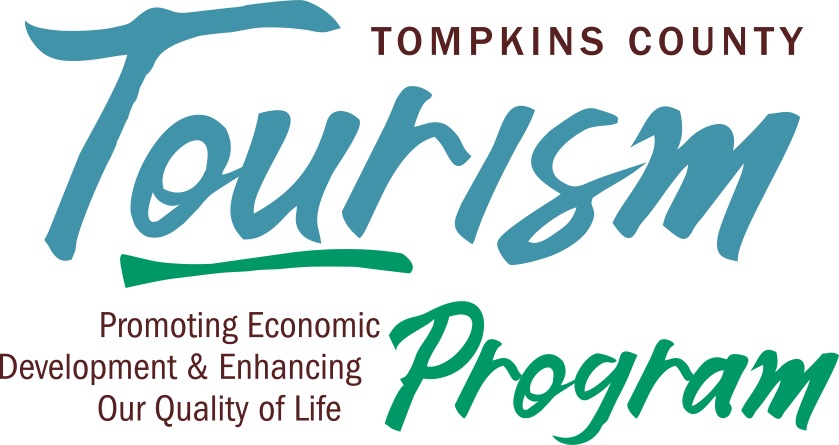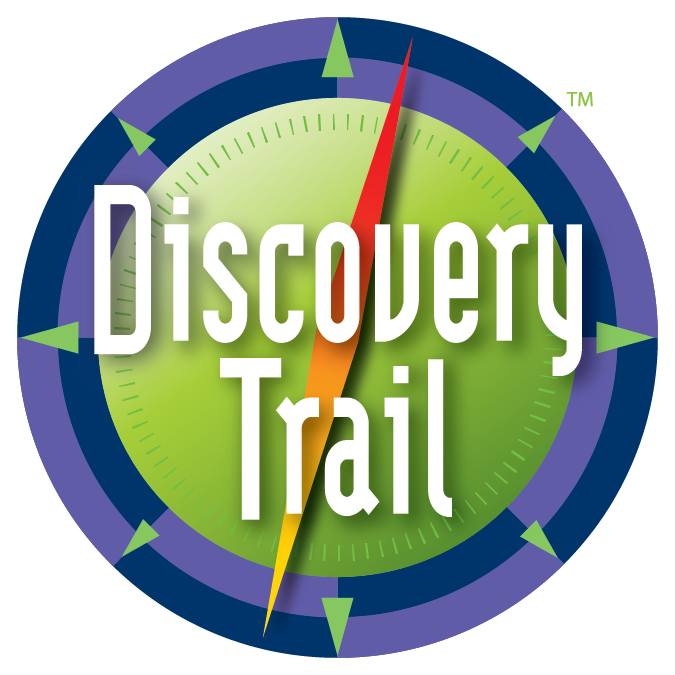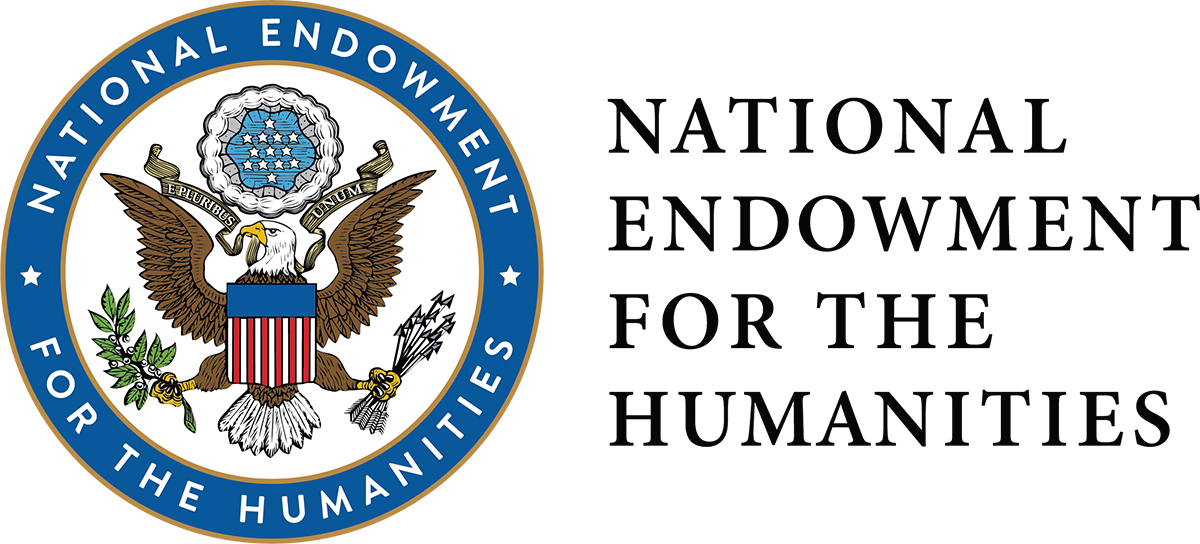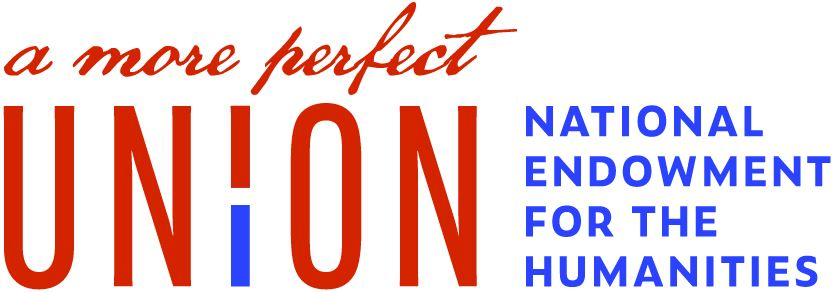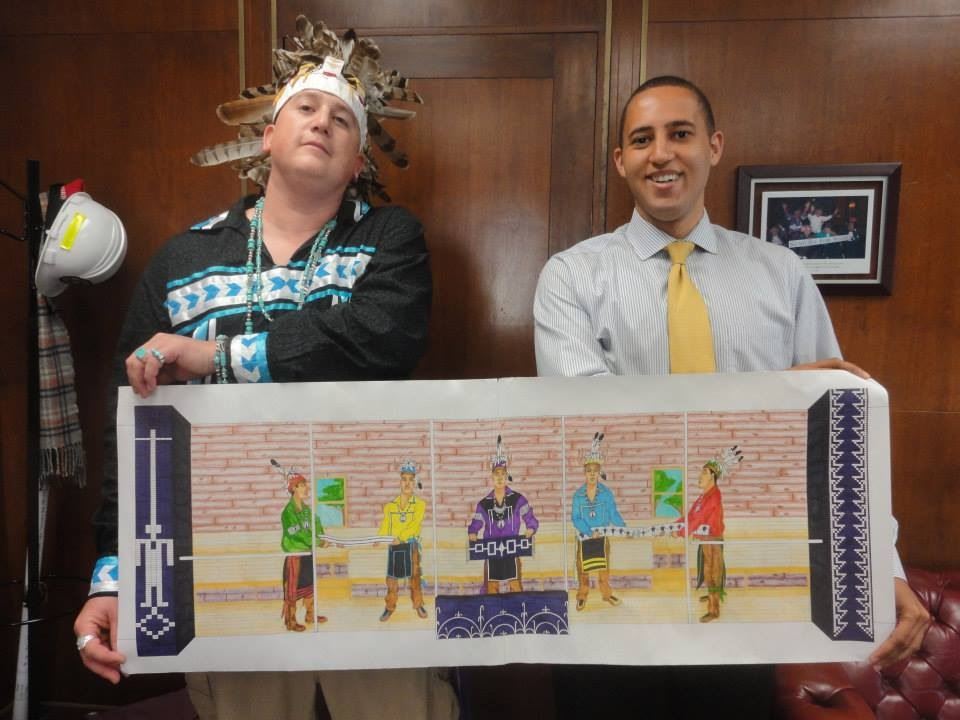 We collectively acknowledge that Tompkins County is located on the traditional, ancestral, and contemporary lands of the Gayogo̱hó꞉nǫˀ Nation (generally known as the Cayuga Nation) one of the Six Nations of the Haudenosaunee Confederacy (sometimes referred to as the Iroquois Confederacy). Tompkins County was also home to the native nations adopted by the Gayogo̱hó꞉nǫˀ ; the Saponi and the Tutelo (Deyodi:ho:nǫˀ), who fled to this region in the mid 1700's, escaping colonization by European immigrants farther South. The History Center and all our programs occur on land that was cared for and called home by the Haudenosaunee Confederacy for over 1,000 years, and the Indigenous cultures ancestral to the Confederacy for time immemorial.
We collectively acknowledge that Tompkins County is located on the traditional, ancestral, and contemporary lands of the Gayogo̱hó꞉nǫˀ Nation (generally known as the Cayuga Nation) one of the Six Nations of the Haudenosaunee Confederacy (sometimes referred to as the Iroquois Confederacy). Tompkins County was also home to the native nations adopted by the Gayogo̱hó꞉nǫˀ ; the Saponi and the Tutelo (Deyodi:ho:nǫˀ), who fled to this region in the mid 1700's, escaping colonization by European immigrants farther South. The History Center and all our programs occur on land that was cared for and called home by the Haudenosaunee Confederacy for over 1,000 years, and the Indigenous cultures ancestral to the Confederacy for time immemorial. 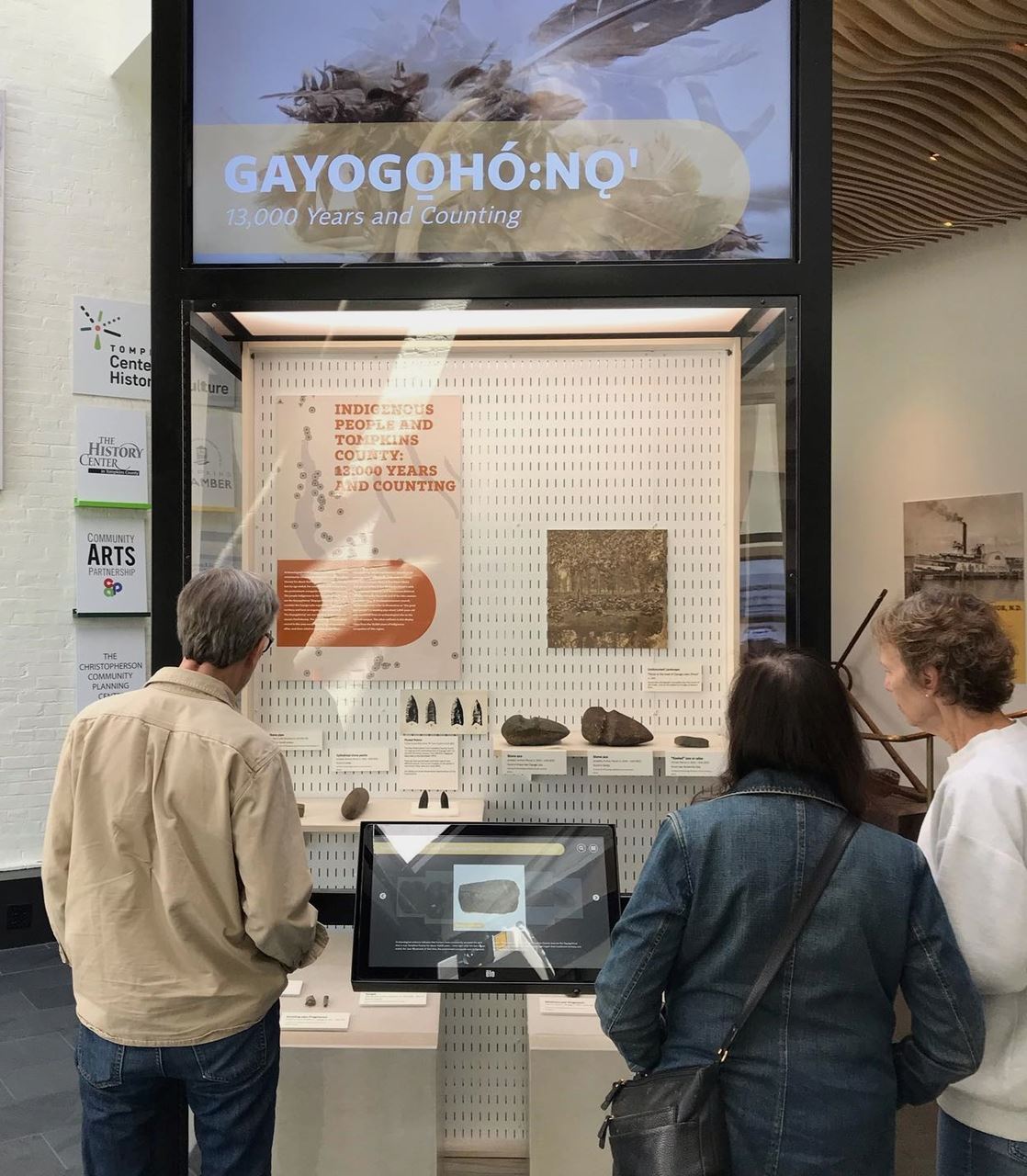
We recognize and continually support the sovereignty of the native nations in this territory and beyond. By offering this land acknowledgment, we affirm tribal sovereignty and will work to hold the The History Center in Tompkins County accountable to Native American peoples and nations. We recognize this to be a living agreement, and much like the George Washington Covenant Belt that was agreed to by representatives of the Haudenosaunee Confederacy and the United States government in Canandaigua NY in 1794, the "chain" of our friendship needs to be polished regularly to reinforce this community bond.
We are grateful to our community partners in the Gayogo̱hó꞉nǫˀ and other Haudenosaunee nations for their support of The History Center in Tompkins County, and their ongoing collaborations with us as we strive to offer authentic programs and exhibits encompassing the full and true history of this region.
The History Center in Tompkins County has submitted this land acknowledgement to traditional Gayogo̱hó꞉nǫˀ leaders for their consideration and approval. We will post a final version as soon as it is available. (Updated as of 2023).
Learn more about how to craft a Land Acknowledgement and build relationship with the Indigenous communities of your area from the following resources: Land Acknowledgement Guide from IllumiNative; American Indian & Indigenous Studies Program at Cornell here; and Honor Native Land Virtual Resource Pack from the United States Department of Arts & Culture.
Our Indigenous collaborators have asked us to note, if you/your organization is not able to commit to the ongoing work of rebuilding relationships with living Indigenous communities a Land Acknowledgement may not be a recommended process for your organization to pursue at this time.
PRONUNCIATION & TERMS GUIDE
For pronunciation of the names of the original inhabitants of the Tompkins County area, Gayogo̱hó꞉nǫˀ is approximately Guy-yo-KO-no and Haudenosaunee is approximately Ho-di-no-SO-ni* sometimes also Ho-di-no-SHOW-ni. Cayuga or Kayuga is considered an anglicization (English-derived) of Gayogo̱hó꞉nǫˀ. Please listen to Gayogo̱hó꞉nǫˀ language keeper Stephen Henhawk’s pronunciation in this video associated with the Gayogo̱hó꞉nǫˀ language course he taught at Cornell.
The History Center uses the spellings and terms for the Indigenous peoples of this region currently most in use by the traditional leadership of the Gayogo̱hó꞉nǫˀ*. The previous common-place name used to represent the Six Nations, "Iroquois", is believed to be a gallicized (French-derived) word from a Huron/Algonquian word which translates to "Black Snakes" or "real adders". It is interpreted by some as a derogatory term used during a period when the Huron and Haudenosaunee were warring, and was not a term originating from any Haudenosaunee language.
Gayogo̱hó꞉nǫˀ or Cayuga can be translated as "People from the Swampy Land" or "People from the Great Swamp."
Haudenosaunee translates to "People building an extended house" or "People of the Longhouse" and describes both the traditional structures the Six Nations lived in, and a representation of the original agreement of their Confederacy (Hiawatha Belt); learn more about the use of Haudenosaunee vs. Iroquois in this video from New York State Museum.
*Gayogo̱hó꞉nǫˀ and Haudenosaunee are both words originating in the Iroquoian family linguistic group (which has 15+ distinct living dialects) and may have subtle differences in pronunciation and spelling interpretation. Gayogo̱hó꞉nǫˀ/Cayuga was entirely developed as a verbal language over millennia, and written variations with set diacritics have been evolving through conversation with living language speakers since the 1990's. As such "Gayogo̱hó꞉nǫˀ " and most words within the language may also be presented with a variety of spellings in Roman and Haudenosaunee alphabets. Here are some examples:
- Gayogo̱hó꞉nǫˀ - also: Gayogo̱hó꞉nǫɁ, Gayogo̱hó꞉nǫ', Gayogohó:nǫ7, Gayógweo:nö’, Gayogweñǵa'geh, Guyohkohnyoh, Goiaconyo, Goiacono, Kwĕñio’ gwĕn
- Haudenosaunee - also: Hodinǫ̱hsǫ́:nih, Hodinöšyö:nih, Hodihnohso:nih, Hodinöhsö:ni’, Hodinoshoni, Hodenosaunee, Hodenushonnees, Haudenosauney
DOWNLOAD HENRY FONT for common Haudenosaunee diacritical marks.
As Gayogo̱hó꞉nǫˀ and Haudenosaunee communities reclaim their language(s) these spellings and visual representations of their language may change. We recognize this as a process of language reclamation due to the severe impacts of colonization over multiple centuries and into the present day.
Perry Ground (Turtle Clan, Onondaga) presents to children and families at The History Center in Tompkins County. January 2020. | Learn About the Gayogo̱hó꞉nǫˀ
|
The Gayogo̱hó꞉nǫɁ People in the Cayuga Lake Region: A Brief History
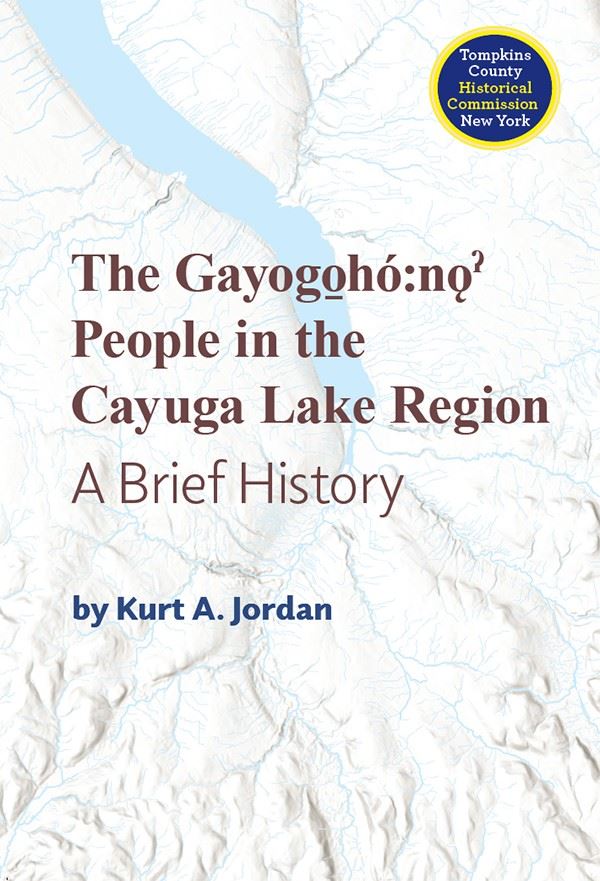
DONATE TO Gayogo̱hó꞉nǫˀ Lanugage Students
Published by the Tompkins County Historical Commission in 2022
Professor Kurt Jordan's history of the Gayogo̱hó꞉nǫɁ brings forward a part of the history of the Cayuga Lake region that had been formerly romanticized or forgotten altogether. It begins at the end of the last ice age 13,000 years ago, and traces the Gayogo̱hó꞉nǫɁ people up to the reoccupation of their traditional territory in 2003, and through current events through 2021. Jordan’s short (80-page) book is constructed as a Western-style history that relies mainly on the written record, archaeological evidence, and some community-based oral histories that Gayogo̱hó꞉nǫɁ people shared with him. Readers will think differently about ancient history, recent events, and the landscape of the region after reading this book. Kurt Jordan is Associate Professor of Anthropology and American Indian and Indigenous Studies at Cornell University. He currently directs Cornell's American Indian and Indigenous Studies Program (AIISP). Jordan has studied the archaeology and history of Indigenous peoples in the Finger Lakes region in conjunction with members of the Hodinǫ̱hsǫ́:nih Nations since 1999.
.png)
